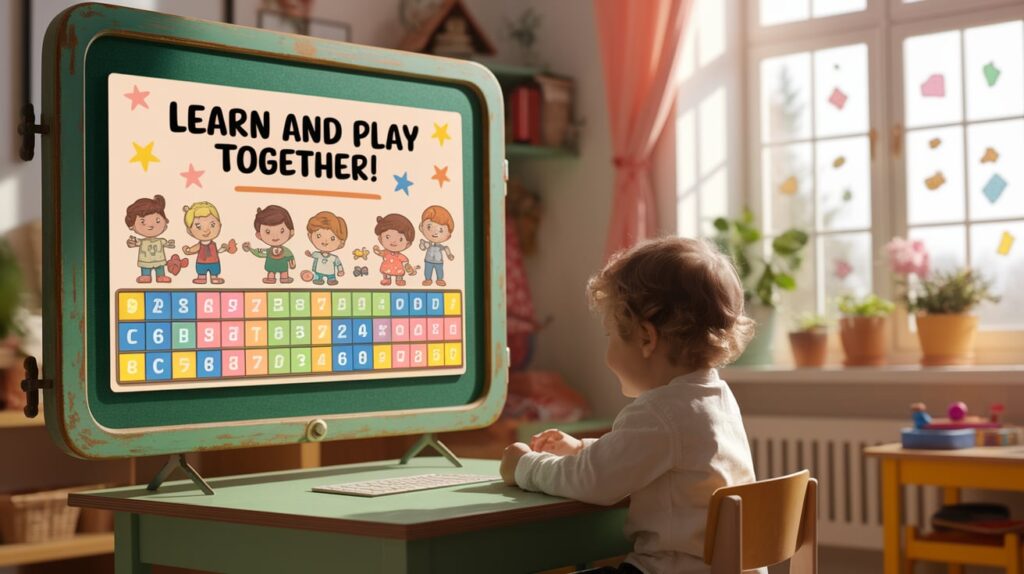Are you looking for a fun way to boost your learning? Educational games might be the answer you’ve been searching for.
Imagine playing a game that not only entertains but also sharpens your mind. Sounds exciting, right? These games are designed to make learning enjoyable and effective. They engage your brain, improve your memory, and help you grasp new concepts with ease.
Plus, they offer a break from traditional study methods that can sometimes feel dull. Dive into this article to discover why educational games are not just good, but great for your development. You’ll find out how they can transform your learning experience, making it more interactive and rewarding. Curious to learn more? Let’s explore the benefits that await you!
Benefits Of Educational Games
Educational games are not just fun; they are beneficial. These games offer a unique way to learn. They engage players in a way that traditional methods cannot. Through play, children and adults can gain valuable skills. These skills help in cognitive development, problem-solving, and memory retention.
Cognitive Development
Games stimulate the brain. They require quick thinking and decision-making. This enhances mental growth. Players learn to process information faster. They also improve their concentration. Educational games provide challenges that promote learning. This helps develop better cognitive abilities.
Improved Problem-solving Skills
Games often present puzzles and tasks. Players must figure out solutions. This boosts problem-solving skills. Games teach strategic thinking. They encourage players to think ahead. Players learn to analyze situations. This skill is useful in real-life scenarios.
Enhanced Memory Retention
Educational games improve memory. Players must remember rules and strategies. This strengthens the brain’s ability to retain information. Games often repeat concepts. This repetition aids memory retention. Players recall information better when needed. This skill helps in academic and daily life.
Promoting Engagement
Educational games boost engagement by making learning fun and interactive. They help students understand complex topics through play. This approach encourages active participation and critical thinking, enhancing the learning experience.
Educational games have taken the learning world by storm, reshaping how students engage with material. By promoting engagement, these games transform passive learning into an interactive journey. But what makes them so effective in keeping students involved?
Interactive Learning Experience
Educational games create a vibrant, interactive learning experience. Imagine a math game where you, as a student, solve puzzles to progress to the next level. Instead of just reading a textbook, you’re actively participating and making decisions, leading to deeper understanding.
Increased Motivation
Games naturally increase motivation through their reward systems. Remember the excitement of earning points or unlocking new levels? This same principle applies to educational games, where achieving goals can boost your confidence and encourage continued effort.
Active Participation
With educational games, you’re not just passively consuming information. You’re actively involved, making choices and seeing their outcomes. This active participation helps in retaining information better. When was the last time you remembered a lecture? Now, compare that to the memory of a game you played.
Educational games hold the power to make learning exciting. By promoting engagement, they ensure that learning is not just a chore but an adventure. What educational game will you try next to elevate your learning experience?
Fostering Creativity
Educational games have a unique ability to foster creativity, transforming mundane learning experiences into thrilling adventures. You might remember the joy of building imaginary worlds with simple blocks or solving puzzles that made you think outside the box. These games tap into your creative potential and can be a catalyst for imaginative growth. Let’s delve into how they encourage imagination, innovative thinking, and creative expression.
Encouraging Imagination
Educational games can spark your imagination by allowing you to explore limitless possibilities. Think of games where you design your own universe or characters. They challenge you to think beyond the ordinary. This exploration can lead to unexpected ideas and solutions.
Consider games that let you create your own stories or scenarios. They invite you to step into different roles and see things from various perspectives. This can enhance your creative thinking and broaden your understanding of the world around you.
Innovative Thinking
Games often present puzzles that require innovative approaches. They push you to find new ways to solve problems, rather than relying on traditional methods. This can be an excellent exercise for your brain, encouraging flexibility and adaptability.
When you face challenges in a game, you learn to think critically. You may start asking yourself, “What if I try this method?” This questioning fosters a mindset that is open to innovation and experimentation.
Creative Expression
Educational games provide a platform for you to express your creativity. Whether it’s drawing, writing, or coding, these games often include tools that let you showcase your talents. This can boost your confidence and help you discover new passions.
Think of games that involve music creation or digital art. They give you the freedom to create, allowing your personality to shine through your work. Imagine how fulfilling it can be to see your ideas come to life in a game.
As you engage with educational games, consider how they can be more than just fun. They can be a powerful tool for fostering your creativity. Are you ready to explore the creative potential within you?
Social Skills Enhancement
Educational games do more than teach academic skills. They also boost social skills. This enhancement is crucial for young learners. Social skills help children interact better with others. Games offer a fun way to practice these skills. Let’s explore how games improve teamwork, communication, and empathy.
Teamwork And Collaboration
Games often require players to work together. This fosters teamwork among participants. Players learn to trust and rely on each other. Everyone must contribute to achieve a common goal. This experience teaches valuable collaboration skills. Children learn how to share ideas. They also learn how to listen and adapt. These skills are useful in school and beyond.
Communication Skills
Clear communication is key in many games. Players must discuss strategies and plans. This encourages them to express their thoughts clearly. They learn to explain their ideas to peers. Listening is also important. Understanding others’ perspectives helps in decision-making. These skills are vital in daily life. They improve interactions at school and at home.
Building Empathy
Games often put players in different roles. This helps them see the world from new angles. Understanding different perspectives builds empathy. Players learn to consider others’ feelings. They also learn to respond kindly and thoughtfully. Empathy is a crucial social skill. It leads to better relationships and a more harmonious world.
Technology Integration
Technology integration in education has transformed the way students learn, offering interactive experiences through educational games. These games are not just tools for entertainment; they are powerful platforms for developing crucial skills. As a parent or educator, you might wonder how technology impacts learning positively. Let’s explore this through three key aspects: digital literacy, adaptation to new tools, and embracing future learning.
Digital Literacy
In today’s digital world, understanding technology is essential. Educational games help students become familiar with digital platforms. They learn to navigate interfaces, solve problems, and think critically. This is not just about playing games but gaining skills that will serve them in digital environments. Have you noticed how children quickly learn to use a tablet or smartphone? That’s the power of digital literacy.
Adaptation To New Tools
Educational games encourage students to adapt to new technologies swiftly. With constant updates and new features, these games keep learners on their toes. They learn to embrace change and become comfortable with new tools. This adaptability is critical in a fast-evolving technological landscape. Are you ready to guide your students through this dynamic journey?
Embracing Future Learning
The future of education is intertwined with technology. By integrating educational games, you prepare students for a tech-driven world. They develop skills in collaboration, creativity, and innovation. These games provide a glimpse into how future learning environments will look. Are you excited to see your students excel in such an innovative setting?
Technology integration through educational games is not just a trend; it’s a necessary shift in modern education. By enhancing digital literacy, fostering adaptation, and embracing future learning, these games offer an engaging and effective way to prepare students for tomorrow’s challenges. How will you use technology to unlock your students’ potential?

Customization And Personalization
Educational games shine with customization and personalization, tailoring experiences to each learner’s needs. These features enhance engagement by adapting to individual skill levels. They make learning fun and effective, helping students grasp concepts more easily.
Educational games are not just fun; they can be incredibly effective tools for learning. One of their standout features is the ability to customize and personalize the learning experience. This means that each player can have a unique journey tailored to their specific needs, interests, and pace. Imagine a game that knows what you need to learn and adjusts itself accordingly. It’s like having a personal tutor in your pocket!
Tailored Learning Experiences
Educational games can offer tailored learning experiences that traditional methods might struggle to provide. They allow you to focus on your strengths and weaknesses, providing content that is relevant to you. If you’ve ever struggled with a particular topic, think about how helpful it would be to have a game that adjusts its content to help you master it.
Adapting To Individual Needs
These games are designed to adapt to individual needs, making learning more effective. You might have noticed how certain games adjust difficulty levels based on your performance. This adaptability ensures that you are neither bored with too-easy tasks nor overwhelmed by too-difficult challenges.
Pacing And Progress Monitoring
With educational games, you can control the pace of your learning. You decide when to speed up or slow down, allowing for a more comfortable and pressure-free experience. Games often include progress tracking features, so you can see how much you’ve learned and what areas need more attention.
Educational games can transform learning into an engaging adventure, offering experiences that are as unique as you are. Have you tried using games to learn something new? How did it change your approach to learning?
Challenges And Considerations
Exploring educational games reveals several challenges and considerations. Balancing fun and learning can be tricky. Ensuring age-appropriate content is crucial for effective engagement.
Educational games are a fantastic tool for learning, but they come with their own set of challenges and considerations. It’s crucial to navigate these wisely to make the most out of the learning experience. By addressing concerns like screen time, educational value, and the balance between play and learning, you can harness the full potential of educational games.
Screen Time Management
Too much screen time can be harmful. It’s important to set boundaries and monitor the amount of time spent on educational games. A timer can be a practical tool to prevent excessive play.
You might remember a time when hours flew by in front of a screen without realizing it. This is what we need to manage. Consider scheduling breaks to keep the mind fresh and engaged.
Ensuring Educational Value
Not all games are created equal. The educational value should be a key factor in choosing which games to play. Look for games that align with learning objectives or curriculum goals.
Check reviews and recommendations from educators and parents. A game might be fun, but does it teach something valuable? Asking this question can guide you to make informed decisions.
Balancing Play And Learning
Striking the right balance between play and learning can be tricky. A game should be engaging but not at the expense of learning. Consider alternating between pure fun games and those with educational content.
Think about the games you enjoyed as a child. How many of them also taught you something? Incorporating educational elements can turn playtime into a productive learning session.
By thoughtfully addressing these challenges, you can ensure educational games become a meaningful part of the learning journey. What strategies do you use to maximize the benefits of educational games?
Frequently Asked Questions
What Are The Benefits Of Games In Education?
Games enhance learning by improving engagement and motivation. They develop critical thinking and problem-solving skills. Collaborative games foster teamwork and communication. Interactive gameplay aids in memory retention. Educational games make learning fun and accessible, encouraging continuous participation and exploration.
How Are Educational Games Effective?
Educational games enhance learning by making complex concepts engaging and interactive. They improve problem-solving skills, critical thinking, and memory retention. Learners enjoy active participation, leading to better knowledge absorption. These games also provide instant feedback, fostering a personalized learning experience.
How Is Gaming Good For Education?
Gaming enhances problem-solving, critical thinking, and decision-making skills. It encourages collaboration and teamwork among students. Interactive games make learning engaging and enjoyable. They provide practical applications of theoretical concepts. Gamified education boosts motivation and retention, creating a dynamic learning environment.
How Educational Games Improve Learning Skills?
Educational games engage students, enhancing critical thinking and problem-solving skills. They provide interactive learning experiences, improving retention and comprehension. Games motivate learners, fostering creativity and collaboration. Tailored challenges in games adapt to individual learning paces, promoting confidence and mastery.
Conclusion
Educational games offer many benefits for learners of all ages. They make learning fun and engaging. Students stay interested and motivated. These games also help improve problem-solving skills. Players think critically and solve challenges. Plus, educational games enhance memory and concentration.
They provide real-world context for lessons. This makes learning more relatable. Parents and teachers see positive impacts on development. Kids learn better and faster. Educational games are a valuable tool for modern education. They support traditional methods. Consider integrating them into learning routines.
You’ll see the difference in comprehension and retention.








